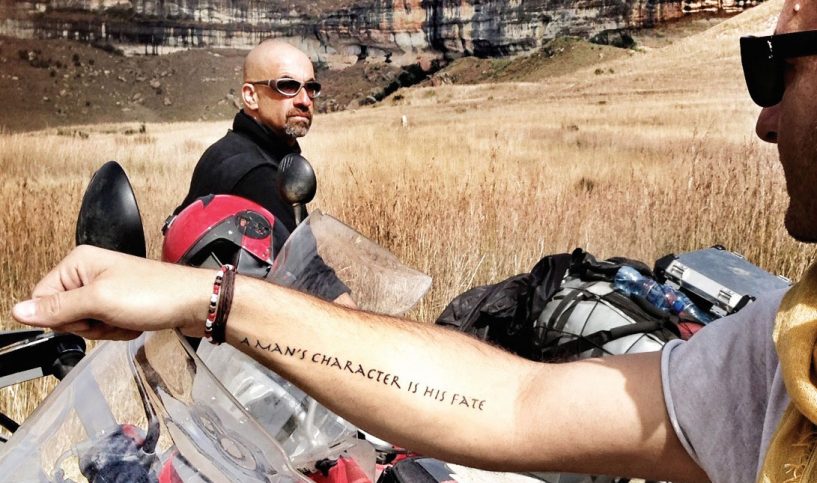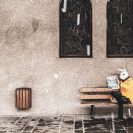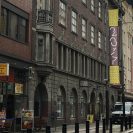By Sarah
Recently, Waleed Shaalan and Christian Ghammachi, two men known in various local circles for their work around Kuwait, decided to embark on a new adventure from the South African city of Cape Town. Now working there as a lawyer, Christian decided to shift from his normal routine and fully embrace the midlife crisis for all of its potential: photographer, artist, and biker, his plan was to travel through Africa from it’s southern tip up to the Mediterranean.
For his part, Christian, now geared up with all his social media mechanisms, plans to make a video documentary of the ride, to raise money for charities in Africa, and to share the experience of what he sees in a global context. Waleed, on the other hand, happy enough just to have made it through his first South African ride, had a different perspective; he has his dreams, he has his vision, but this time, more than anything- the ride was an introspective journey.
While many people make pilgrimages for religious or historical significance, Waleed takes on these long rides precisely because it makes him feel more connected to the circle of life. On a bike, he finds himself closer to the feeling of freedom, lightness, and an outside-the-box lifestyle that can only be found on an open highway at 70 KPH. A motorcycle puts you in touch with the delicate gravitational balance between the mud road beneath you, and the open skies above, you find yourself with no confinements- just the exhilaration of exploration.
“As we stood at the furthest southern tip of Africa, looking at the waves, I was left with an off putting and disoriented feeling of being upside down, ”Waleed said at the first point of his travel. Of course, he wasn’t. It is a mere reflection of the sphere he lives on. It is the fascination of making sense to a world that is constantly changing, moving and rotating.
It seems he also found himself awed into silence, as he adds, “As much as I love music, this time, it was enjoyable to soak up the sounds of nature around me.” As a musician himself, he lives with music, so this is saying quite a bit; but on this inward looking quest, he came to feel in stride with the beat of another rhythm entirely. It would feel sacrilege to plug the earphones, hooked to an IPod; thus, instead, some silence…until the moment when the world starts to sing along.
Soon, the elements of nature on the ride were the most striking experiences. When trying to convey the beauty of nature, he says, “I like being in touch with the darkness as it slowly comes down. The sunrise too, with its quick cracking of light on the horizon, the cold wind breathing down my neck, the opposites switching and imposing a shift as constant as the gears on the bike.
“Staying alive” is the motive behind many decisions and issues made on a bike in the wilderness. Still, the anticipation of problems can alleviate the pressure of potential accidents significantly. But, how much can you anticipate the risks of an unknown road: a narrow path, an abrupt cliff, curves without enough leeway to manage a heavy bike, a truck coming from the other side, no lights at night, climbing a mountain with no room to feel comfortable, no one to call for help, no phone reception? It is a constant presence to have to push oneself beyond their fears. Making the decision that will move the bike a few kilometers, or a few inches or to stop to prevent a further bigger issue, are just some of the small things you can do no matter the road you are on. Sometimes to carry on at all may seems reckless and insane; yet one must press on.
“The fear that shows up at every opportunity made me think of that element again and again: it is as if we think that courage means we can’t have fears; while in reality, it is in the acceptance and management of these fears that enable us to stay alive,” explains Waleed, on one particular night where it was freezing cold we were in a bit of quandary. We found ourselves in a position where going back down the mountain was not an option, and moving forward was too intense. Taking the time to find the strength to acknowledge and give voice to this dilemma, gave us the courage to face it.
Another particularly notable incident involved, some Visa problems. He says, “we had an objective to go to Lesotho – and we did – without a clear plan too.” But, when they got to the border, the immigration officer asked him for a visa, that he did not have. They sat in a small room while it was being determined if they could proceed. Eventually, Waleed talked his way through by managing to find a crack in the man’s kindness. It was an opportunity to change position and be reminded of the limitations that are put on our roads as challenges.
“When I prepare for a bike trip, I prefer not having a plan, to remove as many expectations as possible. I like to experience the freshness of the moment. I prefer to have new eyes. I can say now that I smelled Lesotho, I tasted Lesotho; I felt the temperature of Lesotho radiating from the pavement. I have also seen the inhabitants of Lesotho rich in both dignity and pride. I have learned form the architects of Lesotho in their local interpretations buildings, huts, and houses. I have admired the need for the locals to paint a wall in their courtyard in the quest of both beauty and aesthetics. I have been touched by a kid’s ingenuity when need necessitates him to make a bicycle out of a wire. I have seen them in their original element, tending their sheep and horses.” For Waleed, the glimpse of another life helped him to “get out of the predictability of the norm by stopping the day-to-day routine. It also helps me accept the unknown, and embrace it.”
As an architect constantly seeking creativity, Waleed finds the need to occasionally stop the output and dive into the input phase of his art. He does this by absorbing the substance and tangibility of nature, thus living with the connection of experience with all of his senses. As much as he could get comfortable with the fancy world of malls, spas and manicured lawns, he can equally grasp a simple exposure to the basic elements of life. It is safe to say that the shantytowns of South Africa spoke loudly to Waleed.
The highlight though, of the entire journey of all the highways and mud roads, was the toughest curve, ominously nicknamed “the grace of God.” In the midst of the ride on the curve itself, Waleed had a moment of acute questioning: what is it “the grace of God” and why there? Is it the test of abilities? Is it the difficulties of the task? Is it the confrontation with the curve itself? Or is it the acceptance to the beauty of it all?
Meeting people on the road is another enriching moment. A lady, enquiring about a different culture and a different world, asked Waleed, how did he manage terrorism in his part of world. He couldn’t find another way to explain but to say, “We manage terrorism the same way you manage lions in South Africa.” On a bike, Waleed lives to the fullest and he will ride again.
To follow Waleed Shaalan’s adventures find him on Instagram @wshaalan.








